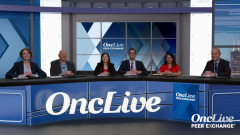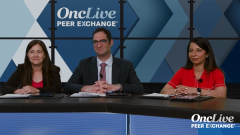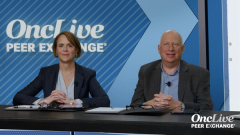
Molecular Testing in Advanced-Stage NSCLC: Use of Liquid Biopsy
Expert oncologists briefly highlight the role of liquid biopsy in the setting of advanced-stage non–small cell lung cancer.
Episodes in this series

Transcript:
Benjamin Levy, MD: Let's move back to the advanced-stage setting. We touched upon this a little bit: liquid biopsy, plasma genotyping, and how important it is. Reiss, you mentioned you're doing this for every patient who walks through the door. At advanced-stage adenocarcinoma, is there a patient that you don't do a liquid biopsy on?
Jonathan Wesley Riess, MD: I don't do a liquid biopsy in some cases. One example is a squamous cell lung cancer patient who has a heavy smoking history with a big chunk of tissue in the bank, which I would probably just send off. Then we have the lung master protocol, which does foundation medicine and broad genomic profiling as part of the study, so we can prescreen for that and so forth. So that's a patient where I wouldn't necessarily do plasma NGS [next generation sequencing] because that early decision is not likely to affect my treatment plan. [With] some patients, for example, who have a big chunk of tissue just waiting in the bank and have a much lower bulk of disease, I'm not pressed for treatment and can wait. Then [there’s] M1a disease, where we know there's less shared circulating tumor DNA in these patients. The sensitivity is less for M1a disease, where it's plural or pulmonary only, and those I have less confidence in circulating tumor DNA [testing].
Benjamin Levy, MD: So those would tell you nothing, essentially, for some of these patients. Any other comments about liquid biopsies and how they're used and leveraged? I'd say the only time I don't do them; I don't do them routinely in squamous cell and I don't do them in a patient with adenocarcinoma that's an advanced stage where I already know; because this doesn't happen a lot, but second opinions where I already know the mutational status. Then, I'm not sure that I would use it. Is there a role for using liquid biopsies at the time of progression for patients that are driver mutation-positive? Is that something that you would do in your everyday practice for EGFR potentially?
All: Yes.
Benjamin Levy, MD: And using it in any other stages other than stage IV right now?
Chaitali Nangia, MD: For CR [complete response] monitoring?
Benjamin Levy, MD: Yes. Or using it in—let's say—a stage 3B patient, where you're going to give chemotherapy, radiation, and, most likely, durvalumab. Is there a role—if you don't have tissue in that setting—to do a liquid biopsy?
Chaitali Nangia, MD: It's the slippery slope again.
Jonathan Wesley Riess, MD: There are some situations where you're not sure, such as stage III and stage IV, when you're not sure if it's progression or not, or you're not sure what some new nodules may mean. In some select settings, I do get circulating tumor DNA, where, if it's positive, it may inform my clinical decision-making. So, I'll give an example. I had a patient with RET fusion-positive lung cancer on selpercatinib. We had some issues and we made some dose adjustments. I wasn't quite sure whether what we were seeing was progression or not, and I sent off a circulating tumor DNA. It was negative. I kept him going, and he's doing really well. So that's the type of example.
Benjamin Levy, MD: I think we'll learn more and more about potential uses of CT [circulating tumor] DNA maybe outside of the stage IV setting, or maybe in real-time monitoring of patients on a targeted therapy. We'll see. We've seen some of this dance. It'll be very interesting to see how this unfolds in the clinic as the research comes out.
Transcript edited for clarity.










































